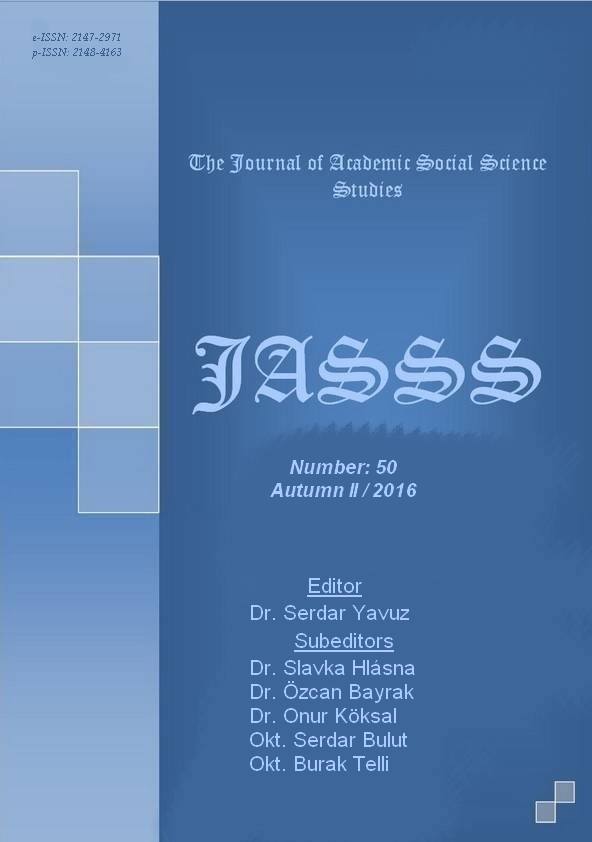TÜRKÇE ÖĞRETMENLERİNİN 2006 TÜRKÇE ÖĞRETİM PROGRAMI ÇERÇEVESİNDE HAZIRLANAN DERS KİTAPLARIYLA İLGİLİ GÖRÜŞLERİ, PROGRAMA YÖNELİK ELEŞTİRİLERİ VE YENİ PROGRAMDAN BEKLENTİLERİ
Author :
Abstract
Bu çalışmanın amacı Türkçe öğretmenlerinin 2006 Türkçe Öğretim Programı’na göre hazırlanan ders kitaplarıyla ilgili görüşleri, programa ilişkin eleştirileri ve uygulanacak yeni programdan beklentilerini belirlemektir. Araştırma Nitel araştırma yöntemine uygun olarak yapılmıştır. Verilerin analizinde içerik analizi gerçekleştirilmiştir. Bu kapsamda; veri özleştirme, sınıflama, sonuç çıkarma, doğrulama gibi nitel veri çözümleme teknikleri kullanılmıştır. Araştırmanın problem durumuna yönelik şu sonuçlara ulaşılmıştır: Öğrenme alanlarıyla ilgili bildirilen görüşlerin %40,77 (f=54)’si; ders kitaplarında verilen metinlerin, etkinliklerin yeterli, verimli ve uygulanabilir olmadığı yönündedir. Buna karşılık görüşlerin %24,16 (f=32)’sı dinleme, konuşma, okuma, yazma ve dilbilgisi becerilerini geliştirmek için verilen metin ve etkinliklerin yeterli, verimli ve uygulanabilir olduğu şeklindedir. Türkçe dersi öğretim programının öğretim amaçlarını gerçekleştirmesine yönelik görüşlerin %13,59 (f= 18)’unun programa yönelik eleştiri türünden olduğu sonucuna ulaşılmıştır. Buna göre; sınıflara göre konu dağılımının orantısız olduğunu, kazanımların gerçekleştirilemeyecek kadar yoğun verildiğini, belirlenen hedeflere ulaşmakta yetersiz kaldığını, kazanımların hangi yöntem ve tekniklerle kazandırılacağının programda yer almadığını, dil bilgisi öğretiminin soyut kaldığını, ders saatlerinin oldukça yetersiz olduğunu… belirtmişlerdir. Görüşlerin %18,87 (f=25)’i hazırlanan yeni Türkçe Öğretim Programı’na (2015) yönelik beklentiler türünden olduğu anlaşılmıştır. Buna göre öğretmenler; yeni programda kazanımların azaltılması, hangi yöntem ve tekniklerle kazanımların verileceğinin belirtilmesi, metin seçimine ölçüt getirilmesi ve dinleme öğrenme alanına yönelik etkinliklerin artırılması gerektiğini belirtmiş, yeni programın ülkenin her bölge ve ilinde uygulanabilir bir nitelik taşımasının gerekliliğini… anlatmışlardır.
Keywords
Abstract
The objective of the present study is to determine the views of Turkish language teachers on 2006 Turkish Curriculum and their expectations from the new program. The study is conducted using qualitative research methodology. Content analysis was conducted for data analysis. In this context, qualitative data analysis techniques such as data reduction, classification, inference and verification. Research questions resulted in the following outcomes: Of the views expressed about the learning areas, 40.77% (f = 54) stated that the texts and activities provided in the textbooks were not adequate, productive or applicable. On the other hand, 24.16% (f = 32) of the views stipulated that the texts and activities provided to develop listening, speaking, reading, writing and grammar skills were adequate, productive or applicable. Of the views expressed on the capability of the Turkish course curriculum in realizing learning goals, 13.59% (f = 18) were critical about the program. Accordingly, the teachers argued that the distribution of subjects among the grades were imbalanced, achievements were so dense that it was impossible to materialize them, the program was inadequate in achieving the determined goals, the methods and techniques required to attain the achievements were not mentioned in the curriculum, grammar instruction was intangible, and the number of classes per week was insufficient. It was observed that 18.87% (f = 25) of the opinions were about the expectations for the new Turkish curriculum (2015). Thus, the teachers stated that achievements should be reduced, information on the methods and techniques required to provide the achievements should be given, criteria should be set for text selection in the new curriculum and the new curriculum should be applicable in all regions and provinces in the country.





